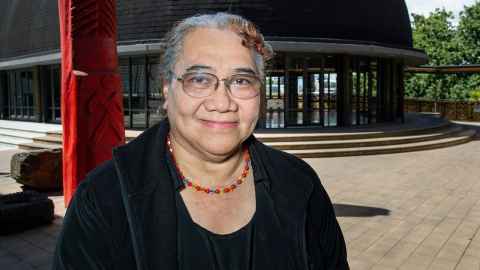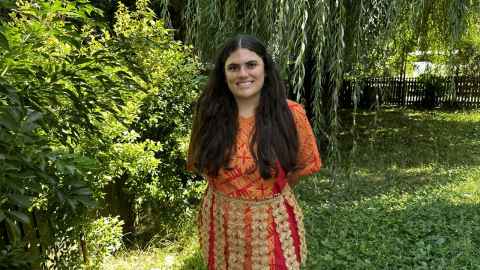Uike Kātoanga’i ‘o e lea faka-Tonga: it's Tongan Language Week
18 August 2024
'E tu'uloa 'a e lea faka-Tongá 'o ka lea'aki 'i 'api, siasí (lotú), mo e nofo-'a-kāingá - the Tongan language will be sustainable when used at home, church and in the wider community.'

The 2024 theme for Tonga Language Week is 'E tu'uloa 'a e lea faka-Tongá 'o ka lea'aki 'i 'api, siasí (lotú), mo e nofo-'a-kāingá - the Tongan language will be sustainable when used at home, church and in the wider community.
Distinguished Tongan linguist Dr Melenaite Taumoefolau is a senior lecturer at the Centre for Pacific Studies, Te Wānanga o Waipapa in the Faculty of Arts at the University. She presented the welcoming address at the New Zealand Association of Language Teachers Biennial Conference, and the World Congress of the International Federation of Language Teacher Associations 2024 in July - Rethinking Pacific Language Teaching.
“The main point of the talk was to suggest that we change the way we teach Pacific languages to 'acquisition' which is the natural process, and let children and learners pick up the language, to acquire it as babies do, not learn it in grammar lessons and in the structured lessons so common in classrooms.
"Ultimately, it is not grammar and structure lessons that I would wish to change in Pacific language teaching but the teaching of the grammar and structure in English. If Pacific language teachers can teach grammar in the Pacific language they are teaching, then the lesson would still be “communicative” in the target language.
"What I’m saying is that Pacific language teachers can teach anything, any content they wish, as long as they teach it in the Pacific language. It may look like a small point but it is a point that would make all the difference to our Pacific language teaching."
She said language teachers play a pivotal role in equipping students with the tools to communicate effectively across borders and cultures. The conference was an opportunity, especially for Pacific language teachers, to share innovative strategies and explore the latest developments in language education to align teaching with maintaining and revitalising languages.

On the language journey
Dr Siobhan Tu'akoi is a research fellow in Pacific Health from the School of Population Health at the University. She draws on the courage and inspiration of her father and paternal grandfather when it comes to her Tongan language journey. Her father migrated to Aotearoa from the small Tongan village of Holonga in Tongatapu, in the early 1980s as a teenager, to continue his education. It was a difficult time, having to navigate between the two worlds while learning a second language.
“He passed down the values of family, collective hard work and perseverance to us kids. I am always humbled by his stories and am proud to continue both my grandfather's and parents’ legacies of education. I hope to keep the same courage moving forward with my own Tongan language journey. Because one of the things that I love most about being Tongan is that when one of us wins, we all win.”
As she embarks on a major three-year research project tackling the high incidences of rheumatic fever within the Māori and Pacific community; Tu’akoi is the realised dream of her elders, achieving success as an academic researcher.
“Growing up, education was always highly valued as a gateway to more opportunities. My grandfather Kelekolio Tu’akoi Malie Langi was a firm believer in this and although they didn’t have much, he built a shed out the back of our land, so my Dad and his siblings could have somewhere quiet to study.”
School of Business and Economics celebrates Uike Kātoanga’i ‘o e lea faka-Tonga | Tonga Language
The University’s School of Business and Economics will host a celebration of lea faka-Tonga on Mon 19 Aug starting at 2.30pm, at the Sir Owen G. Glenn Building on level 3. The event will showcase some of the school’s Tongan champions who have excelled in their fields, as proud Tongans living in Aotearoa.
Te Herenga Mātauranga Whānui | General Library celebrates Uike Kātoanga’i ‘o e lea faka-Tonga | Tonga Language Week
Mālō e lelei, greetings to all! To celebrate, Te Herenga Mātauranga Whānui are thrilled to present a special selection of books from its Pacific Collection, along with photographs that beautifully capture the vibrant language, culture, and heritage of Tonga. Explore the display from August 18th to 24th in the Pacific Space on Level One of Te Herenga Mātauranga Whānui | General Library.
Did you know?
- Tonga consists of 171 islands with approximately 45 inhabited - divided into the three main island groups of Tongatapu, Ha'apai, and Vava'u (excluding the outlying islands.)
- The Tongan diaspora in Aotearoa numbers around 82,000 (the majority reside in Tāmaki Makaurau Auckland) while the population of Tonga sits at over 100,000.
- Most of the Tonga diaspora in Aotearoa understand their heritage language but less than half are speakers of the Tongan language.
- Tonga is the only Pacific nation not to be colonised and is also the only Pacific monarchy of an independent country.
- The Hunga Tonga-Hunga Ha’apai eruption started in December 2021, the eruption of the submarine volcano reached its powerful climax on 15 January 2022; the largest recorded since the eruption of Krakatoa in 1883.
- Tonga’s only native land mammal is the peka, the flying-fox, better known as the fruit bat. Sacred in Tonga, peka are the property of the King; they cannot be hunted as a food source by locals other than royalty. As a consequence the peka continues to thrive in Tonga.